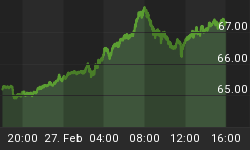
Charts created using Omega TradeStation 2000i. Chart data supplied by Dial Data
It has been a long way down for the Tokyo Nikkei Dow (TNA). Almost twenty-four years after peaking at 38,915, the TNA remains down 63% from those lofty levels. It has been Japan's long nightmare.
The Japanese bear market is 24 years old and counting. To put that in some perspective, the Dow Jones Industrials (DJI) topped in 1929 and it took until 1954 a total of 25 years before the DJI finally took out the 1929 high. Given the TNA remains down 63% from its all-time high, the odds of it taking out that 1990 high any time soon appears to be low to nil. Of course, miracles do happen. Instead of rallying, the TNA appears to be rolling over. The monthly (long-term) trend remains in a bull mode but the weekly (intermediate) trend is flashing sell.
The RSI indictor was recently in the overbought zone. That indicator was flashing "danger" in 2005 as well but it took until 2007 for the market to make its final top. The TNA fell hard during the 2007-2009 financial crash following the markets in North America. The RSI indicator was flashing "danger" in 1983/1984 as well. But the market just kept going higher and it took until January 1990 for the final top to be seen. The lesson is that even when indicators become overbought it is not necessarily a signal that the market is about to breakdown. Other indicators are needed in order to confirm a breakdown.
The S&P 500's monthly RSI has been flashing "danger" now since April 2013 but as noted it does not necessarily mean that the market is about to fall. The lesson is that once the market does break following a long period when indicators were flashing "danger", history suggests that the break could be as strong if not stronger to the downside as the market was to the upside.
Japan's economy has been moribund for years. The Japanese called the 1990's the "Lost Decade". They may be soon calling this period the "Lost Quarter Century". Just as Japan shows signs of improvement, the country slides back once again. It has been suffering a series of rolling recessions coupled with periods of low growth since 1990. At one time, Japan was the world's second largest economy and its banks dominated the globes "top ten". Today Japan has fallen to the number three economy behind China and they have only one bank in the world's top ten ranked by total assets. Over the years, many of its banks were referred to as "zombie" banks.
Of the world's largest industrial countries, Japan's government debt to GDP ratio is the highest, estimated at 227%. When one adds in household, financial and corporate debt Japan's debt to GDP ratio is over 500%. The USA's debt to GDP ratio is often criticized but at a government debt to GDP ratio of 102% and total debt to GDP just under 300% the US's problems seem smaller. There has often been the fear that if interest rates were to rise just 1% in Japan that their entire government budget would have to go just to pay interest on the debt.
Since September 2012, the Japanese Yen has fallen 25% in value. This has caused inflation in Japan as the cost of importing goods has jumped sharply. Japan has few natural resources and as a result is quite dependent on importing things such as oil, gas and other commodities. On the other hand, Japan remains one of the world's leading industrial nations and they are renowned as exporters. Their corporations are global and are amongst some of the biggest corporate names in the world (i.e. Sony, Honda, Toyota and many others). The falling Japanese Yen has helped their exports but it has also set off competitive devaluations of other Asian currencies who do not want to see their currency appreciate sharply thus hurting their exports.
In order to boost their moribund economy Japan embarked on an aggressive quantitative easing (QE) program. In April 2013, they announced a $1.4 trillion QE program. If QE was the panacea that they thought it would be then Japan should be booming right now. The TNA enjoyed a strong rally from the end of 2012 as rumours of the QE program began to circulate. The impact of this massive QE program has disappointed and as a result, the TNA has started to turn down and the Japanese economy rather than being boosted is once again slowing.
Given Japan's massive government debt to GDP ratio, they have little room to maneuver. There are many that believe that the Japanese economy could under the right circumstances become an economic basket case. Japan is also locked in an ongoing dispute with China over territorial claims in the South China Seas. This has raised fears of a military clash between the two countries.
Financial problems and geopolitical problems - that could be a recipe for not only economic problems but social and political problems as well. The stock market would not likely respond positively. The stock market is flashing "danger" so buyers should "beware".















